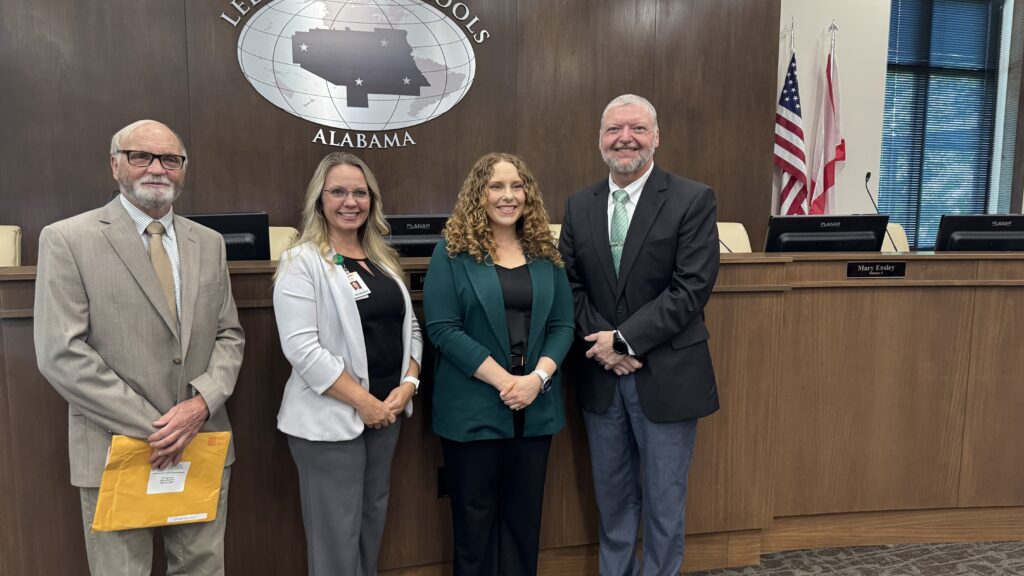County schools require students to store cell phones in lockers, backpacks
BY STEVEN STIEFEL
FOR THE OBSERVER

Catherine Summers, center, was hired as an assistant principal at Beulah High School at the June 10 Lee County Board of Education meeting. Pictured with her are fellow BHS Assistant Principal Donna Bell, left, and Lee County Schools Superintendent Dr. Mike Howard.
LEE COUNTY — New Law Requires Alabama Students to Stow Phones During Class
Starting this fall, K-12 students across Alabama must leave their mobile phones at home or keep them turned off and stored in lockers, under a new state law that aims to limit classroom distractions.
During a recent meeting, members of the Lee County Board of Education reviewed preparations for the new policy. LCS Superintendent Mike Howard said the requirement stems from the FOCUS Act — short for Freeing Our Classrooms of Unnecessary Screens for Safety — which prohibits students from using wireless communication devices during the instructional day in public schools.
Gov. Kay Ivey signed the legislation into law on May 14. According to the Governor’s Office, the measure seeks to reduce distractions and help students focus more effectively on learning. School systems must implement the new policy by July 1.
The FOCUS Act directs students to turn off and store devices such as cellphones, tablets and handheld gaming systems throughout the school day. The law includes exceptions for approved educational use under supervision, medical or accessibility needs like those in Individualized Education Programs and emergencies. For students with learning differences, accessibility features (like speech-to-text, screen readers or timers) provide valuable support.
“Essentially, cellphones must be off during instruction,” Howard said. “They cannot stay on the student during the school day. Different school systems are handling it in different ways — some are using lockers and cars, others are using pouches. We’ve explored all of those because we have a large school system.”
Howard said the district ruled out using lockable pouches, which cost $50 to $60 apiece, due to budget constraints.
“Even if we used them for half our system, it would still cost thousands of dollars,” he said. “Instead, we’re telling students: Don’t bring your devices. If you do bring them, make sure they’re turned off and placed in a locker, book bag or car. Violating the policy will lead to disciplinary action, which we’ll finalize at our administrative retreat in late July.”
He said the district aims to keep the solution simple and cost-effective.
“Rather than handing out pouches — which also raise other concerns — we’re saying, ‘Keep it out of sight, keep it off and we won’t have to deal with it.’ We’re hoping that works. If not, we’ll explore other options, but this is the most affordable one right now.”
A Pew Research Center survey found that 72% of U.S. high school teachers consider student cellphone use a major classroom problem. About 33% of middle school and 6% of elementary teachers reported similar concerns.
Teachers have cited constant notifications, social media use and covert messaging as major distractions. Studies have also linked phones in classrooms to higher rates of academic dishonesty. Teachers also report that phones can enable real-time bullying, exclusion and rumor-spreading during class.
A 2024 National Education Association poll found that 90% of teachers support banning student phones during instructional hours. Seventy-five percent favor an all-day restriction.
Some pushback is expected from parents who provide their children with mobile devices to allow quick contact during emergencies, such as school lockdowns or severe weather, and to coordinate transportation.
The FOCUS Act also directs the Alabama State Department of Education to create an online course about social media safety, which all students must complete before eighth grade. The course will address cyberbullying, phishing and predatory behavior.
Howard emphasized the safety component of the policy.
“Kids face these dangers every day,” he said. “Removing personal devices reduces opportunities for that kind of activity during school. We still use the Internet for instruction, but school-issued devices have controls and approved apps to meet those needs.”
Howard said the policy will apply from the first school bell to the last. It won’t cover bus rides before or after school, but it will apply during field trips.
“If we’re on a bus for a field trip, students will need special permission to use their phones,” he said. “We’re still working out those details. But by early July, we’ll make sure parents and students know exactly what to expect.”
Auburn schools require students to keep cell phones ‘off-the-person’
BY SAM VISE | FOR THE OBSERVER
AUBURN — The Auburn City Schools (ACS) Board of Education convened on Tuesday, June 10, with significant attention given to new student technology policies aimed at enhancing safety and solidifying the leadership of nine school principals.
A major focus of the evening’s discussion revolved around revisions to the ACS Policy Manual, specifically Policy 4.10.4, “Internet Safety and Use of Technology,” and Policy 6.20, “Wireless Communication Devices.”
These proposed changes are a direct response to Alabama’s new “FOCUS Act,” or House Bill 166, signed into law on May 14, which mandates restrictions on wireless communication devices in schools. The bill requires that a board of education have a policy prior to July 1.
“The bill, beyond just cell phones, requires several other subsets of rules and student educational opportunities,” said ACS Superintendent Cristen Herring. “We would provide training, we would provide filters, we would do everything that’s described in this policy to create the opportunity for the safe use of technological resources for our students.
The new policy on wireless communication devices, particularly cell phones, will require students to keep these devices turned off and stored off the person’s body during the instructional day, unless an exception applies. Since ACS does not have lockers for every student, “off-the-person” means in a student’s backpack.
School-issued iPads, however, are not included in this restriction as they are considered instructional resources.
Another action taken by the board was the approval of nine principal employment contracts, effective July 1, 2025. This move ensures stability and continuity in leadership across several Auburn City Schools.
“It is certainly my great privilege to go to finish my 32nd year in Auburn City Schools,” Herring said. “Without question, what makes ACS such a great place to live, work and go to school is the caliber of all the people who serve in the system, notably those are our principals.”
Among the approved contracts was a one-year probationary contract for Gregory Duvall Moore, who will begin as the new principal of Auburn High School.
ACS Board President Kathy Powell expressed optimism, stating, “It is our hope that all things go well in this new relationship, and that it continues for many years.”
Eight other principals received three-year contracts, including Lamarrius D. Anderson (Cary Woods Elementary), Sarah S. Armstrong (J. F. Drake Middle School), Jacquelynne Greenwood (Dean Road Elementary School), Jeffery J. Johnson (Richland Elementary School), Gloria S. Lammons (Auburn Early Education Center), Mary Tonya Nolen (Woodland Pines Elementary School), Ross T. Reed (Auburn Junior High School) and Lisa Michelle Wheatley (Yarbrough Elementary School).
In other business, the board approved the financial statements for May 2025, which showed an ending fund balance of $57.14 million. They also approved two new job descriptions for a Registered Behavior Technician and a Visually Impaired Teacher Assistant.
Additionally, the board approved a bid of $370,831 for a roof coating project at the Auburn Early Education Center and closed out two projects: a network infrastructure upgrade, which saw savings of $48,700, and the Duck Samford Stadium upper field drainage improvements.
The board also formally welcomed a new board member, Brad Chynoweth, whose appointment began on June 1 and runs through May 30, 2030.
The next ACS Board meeting is scheduled for July 8 at 6 p.m. at Auburn Junior High School.


